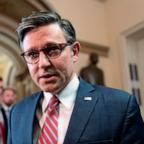Poll Shows 55 Percent of Americans Will Not Take Summer Vacation
A majority of Americans say they won't take a summer vacation this year.
July 14, 2011 — -- Merriam-Webster introduced into its dictionary the word, "staycation," meaning a vacation spent at home or nearby, just as the recession officially ended in 2009. Next to enter into the lexicon may be the word, "naycation."
According to an annual survey by Marist Poll, a majority of U.S. adults, 55 percent, say they will not be booking a summer vacation this year. Only 18 percent said they will take several shorter weekend trips while 16 percent said they will take one or more long getaways. The remaining 11 percent said they will do both or "other."
Of the 45 percent of adults who say they will take a vacation this year, 41 percent said they will take several shorter weekend trips. Though drivers in Los Angeles bracing themselves for the closure of the major 405 freeway, or "carmageddon," may opt to stay very local this weekend.
The national poll results show the continuing waning of a traditional summer vacation, according to Lee Miringoff, director of Marist Poll of Marist College in Poughkeepsie, N.Y.
Marist's survey has asked American adults since 2000, "Do you plan on taking a vacation this summer?"
Those answering affirmatively were 66 percent in 2000, compared to 45 percent this year, the lowest since the survey began. The figure decreased slightly from last year, when 48 percent said they planned to take a summer vacation.
"This is clearly driven by economy," Miringoff said. "The idyllic image of traditional pack your bags and head away for a couple weeks is not what's going on."
Marist conducted the survey from June 15 to June 23 with 1,003 adults over 18. The margin of error was three percentage points.
The unemployment rate rose in June to 9.2 percent, with employers adding only 18,000 jobs that month.
Miringoff said the data may be driven both by lower incomes and less confidence in the economy or one's financial security.
Of the respondents, 34 percent said they have changed their vacation plans this year to save money while said while two-thirds of respondents said they have not. Mirinoff said there has been little change in the survey results since 2009 when the recession officially ended.
The U.S. recession began in December 2007 and ended in June 2009, according to the National Bureau of Economic Research in September 2010, though the organization did not state the economy has returned to "normal capacity."
In 2009, 65 percent of surveyed results said money concerns did not alter their vacation plans while 35 percent said they were financially restricted.




